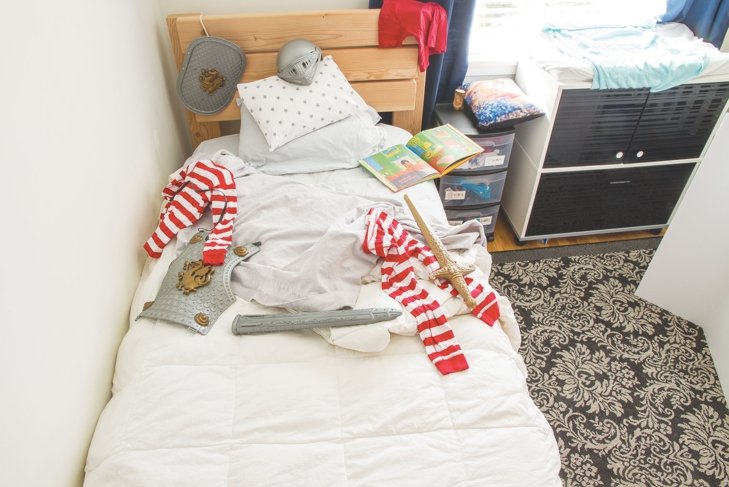
In my house, the call to bedtime also signals the arrival of My Son the Lawyer, an expert negotiator able to extract every scrap of available read-aloud time—that is, when he isn’t tossing all of his bedding onto the floor. Although charming (sometimes), this keeps him up later than is good for him. Sound familiar?
If you have kids, you’ve probably experienced similar frustrations, and maybe worse. Tears, tantrums, playing with toys after lights out … bedtime can turn even the most peaceful home into a battleground. This isn’t just frustrating for you. If it interferes with how much sleep your kids get, it could have serious health consequences. Even reducing sleep by one hour per night can affect your child’s cognition and ability to pay attention.
Inadequate sleep in children has also been linked to diabetes, hypertension and obesity. It can lead to emotional disturbances and behavioral problems similar to those seen in children with attention deficit hyperactivity disorder (ADHD). To top it off, insufficient shut-eye can also impair a child’s learning and academic performance.
On top of all that, by the time you get the kiddos to bed, you may be so exhausted by your courtroom-caliber negotiations that you struggle to fall asleep. So what do you do if you can’t get your kids—or yourself—to sleep?
1. Establish bedtime rituals for everyone.
As a naturopathic doctor, Dr. Meghan van Drimmelen often hears from parents worried about their children’s inability to get to sleep. Her primary recommendation is perhaps the most basic, but it’s also highly effective: “The first thing I ask is whether or not they have a nighttime routine,” says van Drimmelen. “What does it look like when the parents are trying to get their kids to sleep?”
Although every family’s sleep routine will look different, van Drimmelen suggests giving your child a small, nutritious snack and a warm bath, and then reading them a calming story. She also recommends zero screen time for at least an hour before bed. Once the kids are in bed, take a few minutes for yourself. Read a book. Have a bath. Avoid screens and devices.
2. Eat a sleep-friendly diet.
Diet is the next piece of the bedtime puzzle. What you and your children eat throughout the day—not just for a bedtime snack—can have a major impact on nighttime sleep.
“Good protein and healthy fats with meals help to balance blood sugar, and by balancing blood sugar we’re going to be balancing cortisol, which is the stress hormone,” says van Drimmelen. “If stress hormones spike in the night, it’s hard for kids to sleep.”
To keep blood sugar and cortisol in balance during the sleeping hours, she suggests a whole foods diet with plenty of fresh fruits, green leafy vegetables and lean proteins like beans and legumes. Healthy fats from nuts, seeds, olive oil and avocados are also an important part of a sleep-friendly diet (or any diet), says van Drimmelen. She also advises limiting sugar, especially later in the day.
 3. Prepare for back-to-school stress.
3. Prepare for back-to-school stress.
Diet isn’t the only thing that affects cortisol levels. External stressors do, too. If you have trouble dropping off, it might be because your cortisol (stress) levels are high. And it could be the same for your children—especially as summer rolls into fall. For many families, September heralds a hectic new reality: School, daycare and work schedules demand earlier bedtimes. All that stress and anxiety “can impact a child’s ability to fall asleep,” says van Drimmelen.
In her practice, van Drimmelen encourages parents to have active, open communication with their kids about anything that might be bothering them. She also recommends that children get plenty of exercise to help manage their stress. “Exercising in the morning or afternoon, not later at night, is really, really important to balance out different hormones in the nervous system. That will help with relaxation later on at night,” she says.
4. Get help from herbal remedies.
If diet, exercise and a good bedtime regimen don’t do the trick—and you’ve determined with a health care practitioner that there’s no underlying health condition preventing your child from getting a good night’s rest—you can also try herbal remedies and supplements. For starters, try relaxing teas containing camomile, lavender, lemon balm or passion flower.
5. Make room for magnesium.
For stubborn sleep problems, you can also try magnesium supplements. They’re gentle and relaxing for the nervous system and generally safe for children, says van Drimmelen. Magnesium is also present in Epsom salts, which you can try mixing into the bath at bedtime. With luck, a peaceful sleep will soon follow.
Natural tools can’t help with every bedtime challenge, but they go a long way—even if your kids act like you’ve been reading them The Art of War instead of Goodnight Moon every night.
Rest easy
Stress keeping you up at night? Whether you’re worried about a deadline at work or your kids entering a new grade, these super sleep aids may put your mind at ease.
Melatonin is the hormone that your body naturally produces when the sun goes down. Melatonin supplements may help you fall asleep faster and are useful for resetting your sleep schedule (say, when you need to adjust to an earlier back-to-school bedtime).
5-HTP is converted by your body into serotonin, which promotes a calm, relaxed mood. This may not only help you get a better night’s sleep, but also give you a boost of positivity.
PHOTOS BY Denny Dias






























